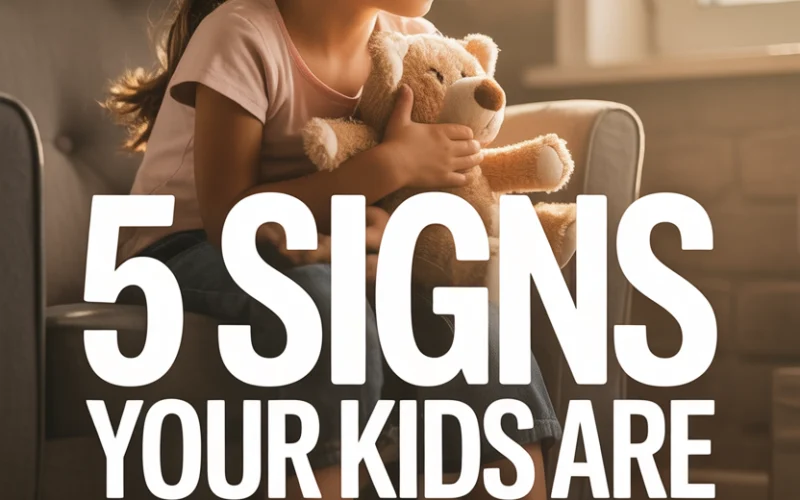When parents separate, there’s no manual to decipher what’s running through your child’s head (if only there was a “Feelings Translator” app—someone pitch that at Dragon’s Den, please).
Kids rarely deliver a heartfelt speech about their emotions.
Instead, the clues show up in the little things, like a sudden talent for dramatic door-slamming or a new “forgetfulness” about brushing their teeth every night.
Most parents are so busy juggling the practicalities—school runs, packed lunches, emails that can’t wait, and remembering which house the PE kit is in—that picking up on subtle signals may fall off the to-do list.
Yet, children communicate distress in ways that aren’t always obvious. Spotting these early can make all the difference for your child (and, honestly, your family’s collective sanity).
Here are five signs that might mean your kids are struggling with the split, and what you can do if you spot them.
1. Changes in Mood That Feel…Unfamiliar
All kids have their off days. One minute they’re giggling at fart jokes, the next they’re sulking because their banana broke in half.
But when you notice new patterns—grumpiness lasting longer, outbursts over tiny things, or a sudden lack of enthusiasm for activities they once adored—it could be more than just a growth spurt or a bad night’s sleep.
Shifts in mood are a classic way for kids to show they’re carrying more than they’re saying.
Researchers at the University of Exeter found that children experiencing family breakdowns are more likely to show signs of anxiety and depression, sometimes masked as irritability or anger (source).
If your usually chatty child becomes unusually withdrawn, or your easy-going kid morphs into a mini volcano, it’s worth paying attention.
What helps? Keep routines predictable. This doesn’t mean militant 6:01pm dinners, but structure provides comfort.
Carve out nightly check-ins—even if it’s just five minutes snuggled up, chatting about the day or rating your meals out of ten (“Mum’s spaghetti: 8.5, but points deducted for mysterious green bits”).
2. School Suddenly Becomes a Battle Zone
Many children channel emotional stress into their school lives. A drop in grades, complaints from teachers, or becoming the new class clown can all be red flags.
Some kids go quiet, others become disruptive, and a few seem to develop a deep spiritual connection with “forgetting” their homework (I promised not to use that word, but you know what I mean).
A study from Child Mind Institute notes that academic struggles and problems with classmates often ramp up after major family changes.
Teachers sometimes spot subtle shifts before parents do, so don’t be afraid to ask them for their perspective—yes, that means booking yet another parent-teacher conference (bring coffee, obviously).
What can you try? Give teachers a heads-up about what’s happening at home. Many schools offer pastoral care or have a counsellor who can check in discreetly.
At home, celebrate effort instead of results—“You worked hard on that, I’m proud of you”—and keep conversations light when possible. No Spanish Inquisition at the dinner table.
3. Sleep Routines Go Sideways
Sleep: the magical reset button for bodies and brains. When kids are anxious or sad, sleep often becomes harder to come by.
Bedtime resistance, nightmares, waking up at odd hours, or wanting to crawl into bed with you every night are popular choices on the “My Parents Split Up” bingo card.
A 2022 study published in the Journal of Family Psychology found that sleep disturbances are especially common in the months following separation.
Those sleep disruptions aren’t just annoying (though, midnight Lego injuries are no joke)—they can worsen mood, focus, and even immune health.
What can you do? Stick to a bedtime ritual like it’s sacred: bath, story, lullabies, the works. Give your child a nightlight or a comfort item from both homes.
If they’re old enough, talk about what helps them feel safe and calm at night—maybe it’s a playlist of gentle music, or just your reassuring presence nearby (even if you’re secretly desperate for some Netflix and silence).
4. Clinginess or Withdrawal…or Both
Kids process big feelings in different ways, and separation can send them swinging between extremes. You might find your child glued to your leg like a limpet, suddenly anxious when you leave the room.
Or, the opposite—they shut you out, spending hours alone in their bedroom, headphones on, communicating exclusively in shrugs.
Neither is “bad” or “wrong.” Both are coping mechanisms. The American Academy of Pediatrics notes that increased attachment or distancing are both normal, especially when routines are disrupted.
How to help? If your child is extra-clingy, reassure them you’re not going anywhere—and follow through on every promise, no matter how tiny (“Yes, I will be back after the school play, and no, I won’t be late this time, pinky swear”).
For the withdrawn child, invite them out for low-pressure time together—a walk, a car ride, hot chocolate at their favourite café. Let them know you’re available, even if they’re not up for talking just yet. Sometimes, side-by-side silence says more than words.
5. Big Questions About the Future or the Past
Anxiety about the unknown loves to sneak into a child’s mind at bedtime. You might be hit with a barrage of questions: “Will we have two Christmases now? What if Dad gets a new girlfriend? Was it my fault?”
These questions can break your heart—and your brain, if you’re not prepared.
Experts agree that children can internalise blame for their parents’ split or become preoccupied with logistics (NHS UK).
You might notice repetitive worries about moving house, changing schools, or whether their hamster is coming along for the ride (“He’s part of the family, Mum!”).
What works? Honesty, minus the gory details. Keep explanations age-appropriate and simple. Reassure your child that they’re loved, that the separation is not their fault, and that adults are handling the grown-up stuff.
Repeat as many times as needed—kids need to hear it more than once (or a hundred times).
Brighter Days Ahead: Helping Kids Heal
Spotting these signs won’t make co-parenting a walk in the park, but it can help you catch emotional bruises before they turn into wounds.
Don’t feel like you have to fix everything by tea time—just being aware, listening, and creating moments of connection goes a long way.
If the signals persist or intensify, or your gut tells you something’s really off, reach out to a GP, school counsellor, or a therapist who specializes in children and families.
It’s not an admission of failure. It’s parenting with your eyes open.
Splits are hard on everyone, but kids are resilient—especially with a parent who’s willing to skip the superhero cape and just show up, every day, with an open heart (and maybe some emergency chocolate).




